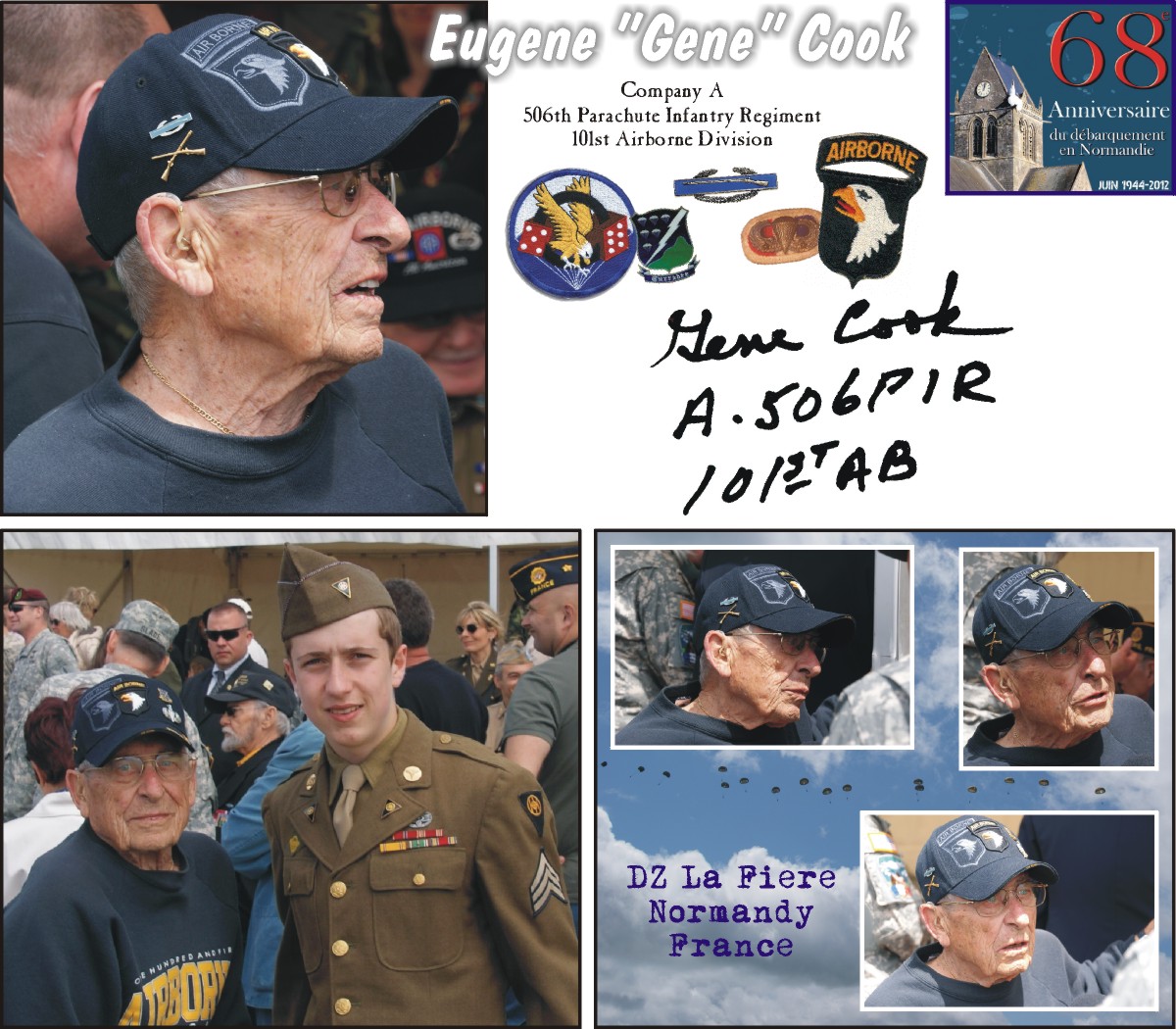Eugene Cook graduated from high school in Geneva, Ohio, in the spring of 1943. He was too young to volunteer for service in World War II, but with his mother's permission, he joined the Army at age 17, was tapped for Airborne training and became a member of the 506th Parachute Infantry Regiment of the 101st Airborne Division.
In March 1944, Cook boarded a troop ship for England, where he joined "A" Company of the 506th Parachute Infantry Regiment of the 101st Airborne Division just months before the Normandy invasion took place on June 6, 1944.
Allied brass had decided Airborne troops would spearhead the invasion of Europe, landing behind enemy lines to disrupt communications and take out fixed fortifications before Allied troops assaulted the beaches. At 10 p.m. on June 5, Cook's unit boarded their planes and headed for battle. Cook remembers seeing the sky filled with planes and, below, the English Channel choked with ships as far as the eye could see.
When Cook jumped at 1:15 a.m. on June 6, he was eight miles from his target. He was also just 275 feet off the ground, less than half the planned jump altitude of 700 feet. Cook soared into space, but because the plane was so low, he was still swinging wildly when he landed in a flooded pasture, breaking his ankle in the process.
Cook cut himself free of the parachute, tightened his boots to make walking on the broken ankle easier and limped alone into the darkness.Hours later, Cook met another American soldier. They paired up and finally came across an officer and 20 other men.
Just after sunrise, they entered a small village, not realizing it was occupied by 200 Germans. After a two-hour firefight, 18 Germans were killed and 75 were captured. The rest ran.
Firefights were constant across the dense hedgerow country as Americans encountered German troops retreating from the beaches. One particularly brutal battle ended in a hand-to-hand bayonet fight.
"After that one you couldn't even walk across that field without stepping on a dead body," Cook said.
Twelve days after the invasion, Cook was finally sent to the rear to have his broken ankle treated. He stayed in the hospital two days before doctors released him and told him to "limp around."
Cook's ankle healed and, in September, he was back on duty when his unit jumped into Holland to begin Operation Market Garden, designed to take control of a highway running north to the Rhine River so allied tanks could cross the Rhine into Germany.
After Market Garden, the 506th was sent to a rest area to be resupplied and train replacement troops. But just two weeks later, the Battle of the Bulge began and Cook's unit joined the fray at 50 percent strength, still without winter gear or fresh troops.
Not a day went by that Cook's men didn't encounter heavy small-arms fire, tank attacks, artillery barrages and knee-deep snow. In a single battle in the deep woods near Bastogne, Cook's unit suffered 30 percent casualties.
The Battle of the Bulge ended in early 1945. That spring, Cook's outfit assisted in the long-delayed crossing of the Rhine. During almost a year in combat Cook received two Purple Hearts for wounds received in battle. As the action in Europe wound down, Cook's unit was ordered to Berchtesgaden, Hitler's personal retreat in the Alps. On the way, they liberated the massive concentration camp at Dachau. Late in the day, Cook saw a procession of men carrying what seemed to be a door with a purple cloth covering something. Cook learned the object beneath cloth was soap made from the bodies of dead prisoners. "That was a bad day," Cook says. "I never want to see anything like that again."
Five months later, Cook was back home and looking to start a new life. He married his wife, Marion, in 1948 and graduated from Case Institute of Technology in 1950 before beginning a 50-year career in engineering.
Cook has visited Normandy countless times since the war ended, and in 1994, he made a parachute jump to help commemorate the 50th anniversary of the Normandy invasion.
"I've always loved going back there," he says. "It reminds me of what great sacrifices so many made to keep this country great and free."
